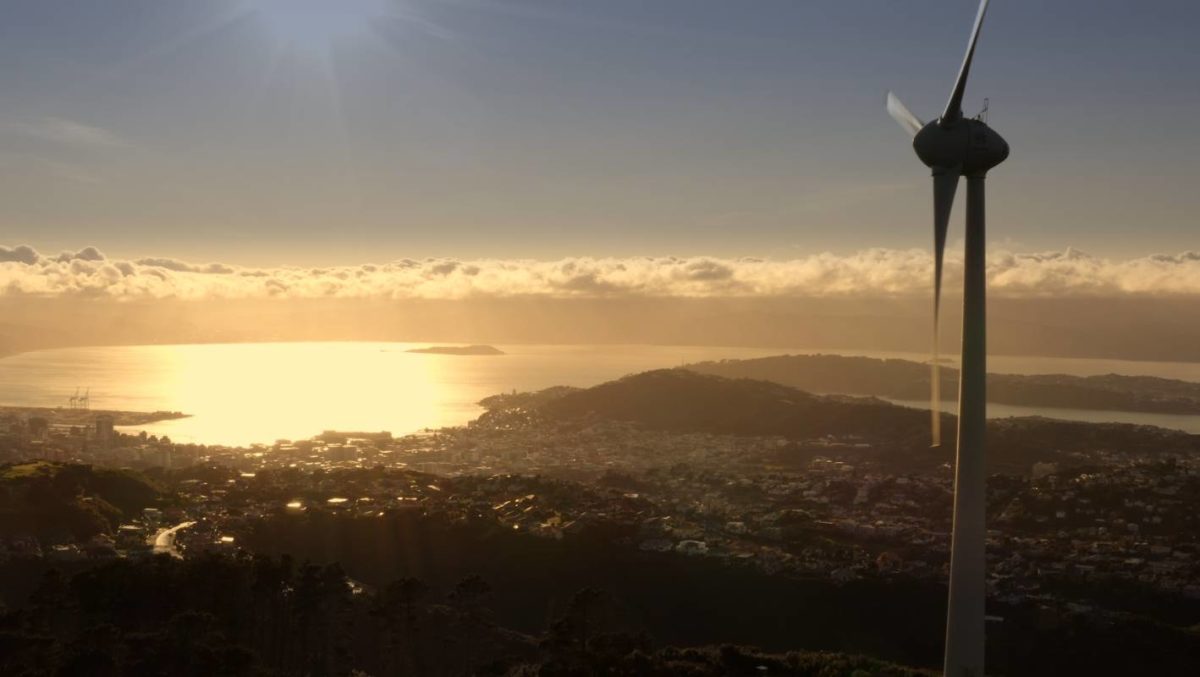High above Wellington, the windiest city in the world, the iconic Brooklyn wind turbine turns the city forward. It is a truth universally acknowledged after 5p.m., that a city is judged on the quality of its beer. For instance, Brisbane is not judged on its Queensland climate, nor for its proximity to late Aussie icon Steve Irwin’s Australia Zoo, but on its famous thirst-quencher, XXXX, so named because Queenslanders can’t spell beer.
It is for this reason that Garage Project, a Wellington brewery, decided to partner up with leading Kiwi renewable power generator Meridian to launch Turbine beer, a celebration of the brewer’s 100% renewable energy certification.
Garage Project is excited to brew in a more sustainable way, and the Turbine Pale Ale is a fresh take, or, if you insist, a fresh spin, on the traditional Pale Ale style so popular in the Antipodes. Brewed with a juice golden malt base, the beer is a satisfying balance of bitterness and citric tropical hop character; and if that thought doesn’t entice every hipster within earshot, it should be said that Turbine is, in fact, the first certified renewable energy product available in New Zealand.
The only cause for concern, as an Australian observer, is that because the Kiwis pronounce beer, “bear”, every time Garage Project mentions its wind inspired beer in their promotional video, I suffer the momentary fright entailed in the image of a ferocious Grizzly charging at me with the assistance of a tailwind.
“There has been strong demand for certified renewable energy for some time,” said Michael Healy, CMO of Meridian, “as New Zealand’s largest renewable energy generator it’s only natural we find ways to make this happen.”
The iconic Brooklyn wind turbine, a landmark on the Wellington skyline and featuring on the Turbine beer’s label, is a wind turbine owned by Meridian. Garage Project’s co-founders Jos Ruffell and Pete Gillespie were already looking to create a beer to celebrate their Wellington home, and as a company already ambitious and inventive in sustainability, the idea to partner with Meridian and source the very energy used in the making of the beer from the city’s renewable landmark seemed perfect.
Chicago coined itself the Windy City before Wellington got the chance, but let’s not forget that Chicago’s famed windiness is not derived from the breeze coming in off Lake Michigan, but from the prevalence of “windbag” politicians in the late 19th Century. Of course, American politicians have changed significantly since then. For years Wellington has been trying to claim the windy title but ironically nobody could hear them for the perpetual noise of gale force winds. Wellington’s next bright idea was to call its Super Rugby team the Hurricanes, but the team has never been much good. Perhaps then, finally, with the Turbine Pale Ale inspired by the city’s renewable energy landmark, Wellington can claim its rightful windy throne.
Ruffell says the brewery is proud to be the first to use Meridian’s certified renewable energy mark made possible by its participation in the NZECS. “It’s important to set an example and show you can be in business and do your bit for sustainability too,” said Ruffell, “we can brew the beer we love, be sustainable, and celebrate Wellington, the city we love. Turbine Pale Ale is all of these things.”
Of course, Meridian can’t just run a personal cable from the turbine down to the Garage Project brewery, but the renewable energy certificate provided by the New Zealand Energy Certificate System (NZECS) is the assurance that any electricity used by the brewery is matched on an annual basis with 100% renewable energy generated from Meridian’s Brooklyn Turbine.
Meridian worked with NZECS to produce the renewable energy certificate which can now be attained by other sustainable companies utilising energy generated by sources like solar PV and wind up and down the land of the long white cloud.
This content is protected by copyright and may not be reused. If you want to cooperate with us and would like to reuse some of our content, please contact: editors@pv-magazine.com.









By submitting this form you agree to pv magazine using your data for the purposes of publishing your comment.
Your personal data will only be disclosed or otherwise transmitted to third parties for the purposes of spam filtering or if this is necessary for technical maintenance of the website. Any other transfer to third parties will not take place unless this is justified on the basis of applicable data protection regulations or if pv magazine is legally obliged to do so.
You may revoke this consent at any time with effect for the future, in which case your personal data will be deleted immediately. Otherwise, your data will be deleted if pv magazine has processed your request or the purpose of data storage is fulfilled.
Further information on data privacy can be found in our Data Protection Policy.